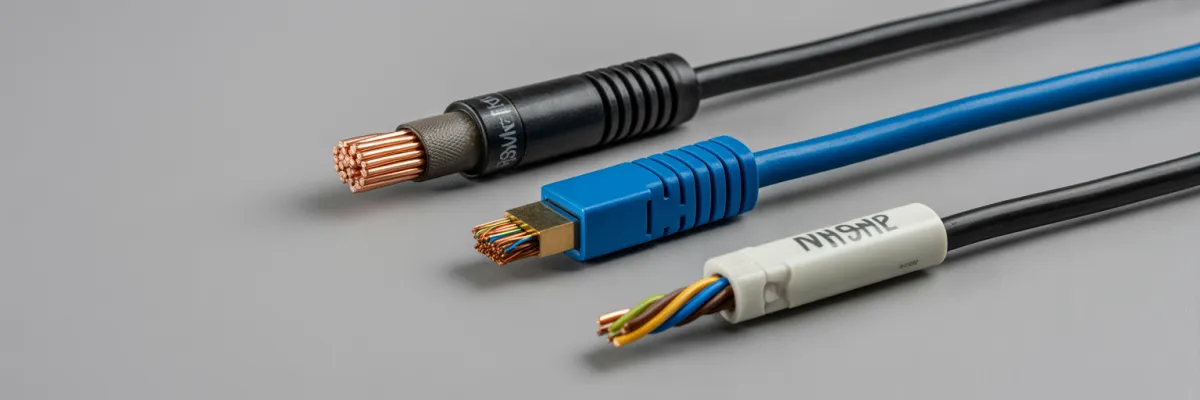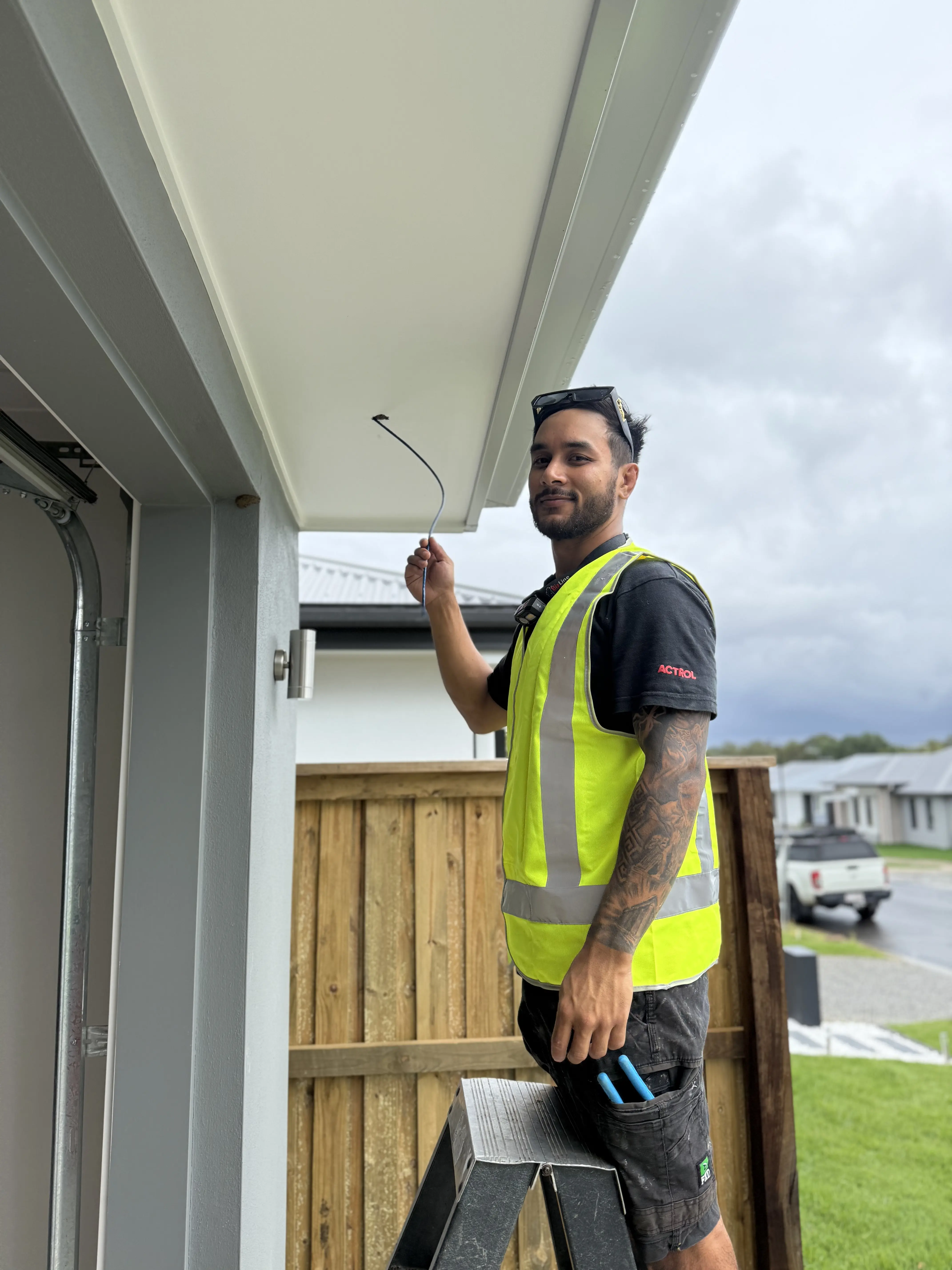
CCTV Cable Installation: The Complete Professional Guide for Brisbane Businesses
Here's something most Brisbane business owners don't realize until it's too late: you can spend $10,000 on the best security cameras money can buy, but if the cables connecting them aren't installed properly, you're basically throwing that money away.
I learned this the hard way years ago when a warehouse owner in Eagle Farm called us in a panic. His brand new $15,000 CCTV system had completely failed after just eight months. The cameras? Still perfect. The problem was the cables—installed by someone who clearly didn't understand Brisbane's climate. The UV exposure had turned the cable jackets brittle, moisture had corroded the connections, and during one of our typical summer storms, the whole system went down.
That expensive lesson cost him another $4,500 to fix properly, plus he'd lost security footage during two separate theft incidents while his system was down.
Professional CCTV cable installation isn't glamorous work, but it's absolutely the backbone of your security system. Poor cable choices, sloppy routing, or skipping weatherproofing steps will cause signal loss, grainy footage, or complete failures—usually right when you need the system most.
For Brisbane businesses, there's an extra layer of complexity. Our subtropical climate is brutal on electronics. Intense UV radiation, humidity that hovers around 70%, violent electrical storms, and temperature swings create a perfect recipe for cable degradation.
This guide walks through everything you need to know about CCTV cable installation. You'll learn which cable types actually work in our climate, how to route them properly, and the weatherproofing techniques that separate professional installations from amateur disasters.
What Type of Cable Is Used for CCTV Installation?
Three main cable types are used for professional CCTV installations, and picking the wrong one is probably the most expensive mistake you can make.
1. Coaxial Cable (RG59/RG6)
This is traditional CCTV cable that works with analog cameras and HD-over-coax systems. You can run video signals 300 to 500 meters depending on the cable quality.
RG59 is the thinner version—fine for shorter runs up to 200 meters. RG6 is thicker with better shielding and less signal loss over distance. If you're running HD cameras or need longer cable runs, RG6 is worth the extra cost.
Best for: Traditional CCTV systems, cost-effective installations, anywhere you've already got coaxial infrastructure.
2. Ethernet Cable (Cat5e/Cat6)
IP cameras need ethernet cable, and here's the bonus—these cables can carry both your video data AND power to the camera simultaneously through PoE (Power over Ethernet). One cable does everything.
The catch is distance. You're limited to 100 meters without adding network switches or extenders. Cat5e handles basic IP cameras fine, but Cat6 is what we recommend for most commercial jobs. It's faster, handles interference better, and when you inevitably want to upgrade to 4K cameras in a few years, you won't need to rewire everything.
Best for: Modern IP camera systems, future-proof installations, simplified power delivery.
3. Siamese Cable
Think of siamese cable as RG59 coaxial and a power cable joined together in one jacket. It simplifies installation because you're pulling one cable instead of two separate runs. You'll pay more per meter but save 30-40% on installation labor.
Best for: Analog cameras requiring separate power, outdoor installations, anywhere installation time matters.
The Brisbane Factor
Here's what matters most for our climate—whatever cable you choose needs UV-rated jacketing if it's going outdoors. I've seen non-rated cables turn brittle and crack within 18 months of Brisbane sun exposure. Even "outdoor rated" cables last longer when you run them through conduit. The extra $200-300 in conduit materials will save you from a $2,000+ rewiring job down the track.
Most modern commercial installations around Brisbane are moving toward Cat6 for IP cameras. The flexibility, image quality, and future-proofing usually justify the investment.

Cable Selection Criteria for Brisbane Commercial Installations
Brisbane's environment will absolutely destroy cables that work perfectly fine in other climates.
Environmental Factors You Can't Ignore
Brisbane's UV index averages 11-12 during summer months—that's in the "extreme" category. Standard PVC cable jackets become brittle and crack within 18-24 months of direct sunlight.
UV-rated cables use polyethylene (PE) jacketing or UV-stabilized PVC with carbon black additives. I've tracked installations over 5+ years:
Standard cable, no protection: 12-18 months before visible damage
UV-rated cable, no protection: 4-6 years typical lifespan
UV-rated cable in conduit: 10+ years with minimal degradation
A car dealership on Gympie Road installed cameras using standard RG6 exposed on their fence line. By month 20, the jackets were cracking. By month 24, they were getting interference and signal loss. They spent $2,800 replacing everything with conduit-protected UV-rated cable—should've done it right initially for an extra $400.
Brisbane's humidity sits around 60-70% year-round. That constant moisture attacks cable connections more than the cable itself. The solution isn't better cable—it's better connection protection with heat shrink tubing, silicone sealant, and properly rated junction boxes.
Indoor vs Outdoor Cable Requirements
Commercial buildings require specific cable ratings based on where the cable runs—mandated by AS/NZS 3000 wiring rules.
Plenum-rated cable (CMP): Required for air-handling spaces like drop ceilings. These cables use fire-retardant jacketing that produces less smoke during fires. You'll pay 30-40% more, but it's not negotiable.
Outdoor-rated cable: Needs UV-resistant jacket, moisture resistance, and proper temperature rating. Most Brisbane commercial installations use outdoor-rated cable in conduit—the sweet spot of protection and cost-effectiveness.
A medical practice in a Brisbane CBD office building got hit with a failed inspection because their installer used general-purpose Cat6 in the ceiling plenum. They had to replace 300+ meters of cable with plenum-rated versions. Cost them $3,400 plus inspection fees and delayed their system activation by two weeks.
Distance Limitations Matter
Coaxial distances:
RG59: Reliable up to 200 meters for analog
RG6: Reliable up to 500 meters for analog
Ethernet distances:
All categories: 100 meters maximum (non-negotiable physics limitation)
Solutions for longer runs: PoE extenders ($80-150 each) or network switches
A warehouse in Lytton needed cameras 180 meters from their server room. One PoE extender at the 90-meter mark solved it perfectly. Total added cost was $95 for the extender plus $30 for a weatherproof enclosure.
Weatherproofing for Brisbane's Brutal Climate
Brisbane's weather will find every single weakness in your cable installation.
Connection Point Weatherproofing
For outdoor coaxial connections, compression connectors are non-negotiable. Twist-on connectors might seem fine initially, but they allow moisture penetration within months.
A retail center in Carindale had 12 outdoor cameras with twist-on connectors. Within 14 months, 7 cameras were showing issues. We replaced all connectors with compression types and added proper weatherproofing. Three years later, zero connection failures.
For ethernet connections outdoors:
Use weatherproof junction boxes (IP65 or IP67 rated) for all outdoor ethernet connections. Never leave ethernet connections exposed outdoors, even for "temporary" installations.
Apply marine-grade silicone sealant around the entire connector body, not just where cable enters. Use heat shrink tubing with adhesive lining for maximum protection.
Drip Loops Are Non-Negotiable
Every outdoor connection needs a drip loop. The cable should come down to the connection point, form a U-shape below the connection, then come back up to enter. Simple physics prevents 90% of water intrusion.
A retail store in Fortitude Valley had their installer skip drip loops on 6 outdoor cameras to save 10 minutes. Within 8 months, all 6 connections showed corrosion. Emergency service call plus replacement of all connectors cost $680. Doing it right initially would've taken 10 extra minutes and zero extra cost.
Lightning and Surge Protection
Brisbane averages 40+ lightning strikes per square kilometer annually. Install surge protectors on both power and data lines.
For coaxial systems: Install video surge protectors at both camera and recorder ends ($25-40 each).
For IP camera systems: Use PoE surge protectors that protect both data and power ($40-80 each).
A distribution center in Lytton lost $8,000 in equipment during a lightning storm because they'd skipped surge protection to save $400. Proper surge protection would've prevented all the damage.
Common Mistakes

Testing and Verification
Installation isn't complete until you've verified everything works properly.
Cable Testing
Use a multimeter to verify all cable conductors are connected properly. For coaxial, check continuity of center conductor and shield. For ethernet, verify all 8 wires.
Professional ethernet cable testers verify all 8 wires connected correctly, no shorts or opens, proper wire pairing, cable length, and signal quality parameters. Basic testers cost $50-100.
A property manager in New Farm hired a "budget" installer who didn't test cables. Three cameras never worked properly from day one. When we tested the cables, one had miswired pairs and another had a short. Proper testing during installation would've caught both problems immediately.
Image Quality Verification
Test cameras after dark with IR illumination active. Night vision draws more power and uses more bandwidth—problems that don't show during day testing often appear at night.
A retail store in Carindale thought their camera installation was fine until they reviewed footage after a nighttime break-in. The image quality degraded so badly after dark that faces were unidentifiable beyond 3 meters. Proper night testing during installation would've caught the problem.
24-Hour Burn-In Test
Run system continuously for minimum 24 hours before final acceptance. This catches overheating issues, network stability problems, storage capacity issues, and power supply problems under sustained load.
Get Your Professional Cable Installation Assessment
Not sure which cable solution fits your Brisbane business? Our security experts provide complimentary site assessments to identify the optimal cable infrastructure for your specific needs.
During your 30-minute consultation, we'll evaluate your camera locations, assess Brisbane weather exposure, recommend cable types and routing strategies, and provide transparent pricing with no hidden costs.
📞 Call: +61409809577 / 0409809577


